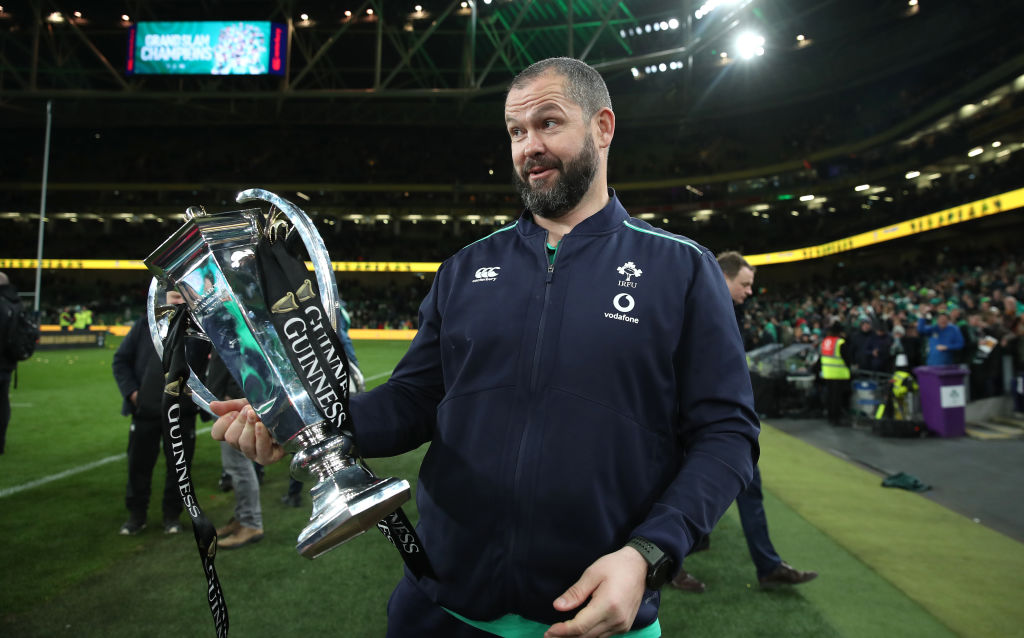Cross-code skills: Why we’re seeing rugby league coaches in union

So often sports cross-pollinate: sharing ideas from one discipline to another, exchanging mindsets and capitalising on strengths. Rugby is no different.
And while some of the game’s leading lights step into completely different sports – such as Gilbert Enoka, responsible for New Zealand Rugby’s “no dickheads” policy, joining Chelsea – others stay closer to home, as with the influx of rugby league coaches at the highest level of European rugby union.
Steve Borthwick, England’s head coach of four months, is rugby union through and through, but his trusty defence coach Kevin Sinfield played for league powerhouse Leeds Rhinos more than 500 times.
World in union
Borthwick’s captain Owen Farrell was brought up in rugby league territory with his father a Wigan Warriors triple centurion. Andy Farrell is now head coach of world No1 side Ireland, who have just won a Grand Slam Six Nations title ahead of this year’s World Cup.
Across the English channel, among the flair and flamboyance of Fabien Galthie and Raphael Ibanez is the gritty and dogged Shaun Edwards, former Wigan Warriors player and Welsh rugby defensive revolutionary.
And over the Severn Bridge in Welsh rugby is Mike Forshaw, a defensive appointment formed in the 1990s by Wigan, Wakefield and Leeds.
There has long been a steady flow of cross-coders making the switch to union but to see a number of them having such a prominent position across some top European nations in a World Cup year is genuinely exciting.
“Generally, union is pretty insular and hasn’t taken in coaches from other sports aside from league, and that is a newer fad,” Sam Larner, a rugby analyst, told City A.M. “Although we might not want to admit it, there are fashions in sport just as there are in clothes.
“As a general rule, league coaches coming into union tend to come as defence or contact coaches – there is more defence in league, typically around 700 tackles per game compared to around 200 in union.
“There was a desire around the early 2010s to create hyper aggressive defences who didn’t want to defend for very long and instead just steal the ball back. That was something Wales and Saracens did effectively.
Rugby attack
“The three key elements are attack, defence, and kicking. League attacks, for example, have to be better because you are usually attacking 13 against 12 (one defender deep to return kicks) and no defenders are committed to a ruck so it’s 13 attackers on their feet versus 13 defenders on their feet.
“Most of the modern union attacking shapes are transposed directly from league. For example, an incredibly common attack is the X-Ball. That features one attacker running from outside to in and one running from inside, round the back, to the outside. It’s the core of the Irish attack, although they run it in many guises. That is taken pretty directly from league.”
But whether these coaches are actually special remains up in the air for some. A prominent pathway coaching expert told City A.M. that while rugby league backgrounds can lend themselves to suiting union, league itself isn’t a sport that’s as aligned with union as one would think.
The expert said that league has little-to-no contest for possession while union does, and scrums and lineouts don’t hold as much importance in league whereas they do in union. Furthermore, there’s little offloading in comparison and attackers are further away giving defensive lines time to think.
Grit
Effectively, they’re different enough to not make a difference. So what is it about the league coaches that union sides desire? The grit, determination and discipline? The preference to strong defensive lines? An enhanced need for a multi-dimensional kicking game?
Whatever the answer, it’s working for the likes of Ireland and France with Farrell and Edwards respectively.
Ireland in particular have one of the most rounded games in world union. They are attackers and defenders, kickers and catchers, scrummagers and line breakers. They’ve got it all, all under a former league legend.
And in France, Edwards has transformed an outfit once famed for its inaccuracy and ill discipline into one who are reliable and ferocious.
“In general, union has taken more from league than it has given,” Larner added. “That’s not going to stop. Farrell is arguably the best head coach in the game and Edwards is arguably the best defence coach.
“We’re bound to see more teams put their faith in league coaches.”